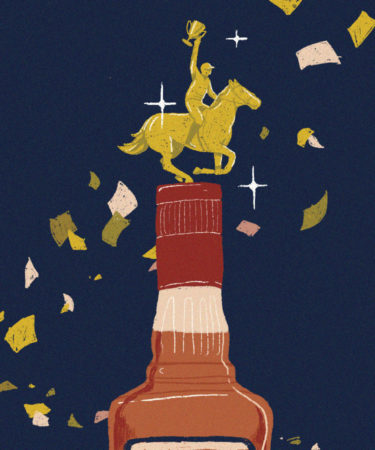The bonds linking bourbon and the Kentucky Derby run deeper than Mint Juleps. Local lore links the Bluegrass State’s world-class whiskey and world-beating thoroughbreds in another, unusual way: Kentucky water.
Kentucky’s famous limestone water, some say, is not only ideal for bourbon production but for strengthening the bones of the horses that graze the state’s calcium-rich pastures.
It’s a romantic notion, though lacking in empirical evidence. But there are other, verifiable tales linking bourbon brands to the Derby. The most impressive features the most famous bourbon of them all: Pappy Van Winkle.
Old Rosebud, the winner of the 1914 Derby, had a “solid bourbon pedigree,” Kentucky-based author Susan Reigler writes in her book, “Which Fork Do I Use With My Bourbon?” That horse was named for owner Hamilton C. Applegate’s bourbon brand (which no longer exists). At the time, Applegate also served as the board of directors at Churchill Downs.
Paul Jones, the 1920 Derby winner, also gained its name from a then-popular whiskey brand. While this label is no longer around, either, the Jones family owned another bourbon brand that’s very much enjoyed to this day: Four Roses.
And now, for Pappy.
“My grandmother loved to get up early in the morning and go out and cut flowers; she also liked to find four-leaf clovers,” says Sally Van Winkle Campbell, a Kentucky-based author and granddaughter of Julian “Pappy” Van Winkle Sr.
According to Campbell, on Derby weekend in 1938, Kansas City businessman Herbert M. Woolf rented a house across the street from the Van Winkle family. His horse Lawrin was running in that year’s race. On the morning of Derby Day, Campbell says, her grandmother Katherine Van Winkle was picking flowers in the garden when she came across a four-leaf clover.
“She had her driver take the clover across the street on a silver tray, along with a lace doily, a couple of Mint Juleps in silver cups, and a note that said, ‘Put this under your horse’s saddle this afternoon and you’ll win the Derby,’” Campbell says.
Given that Lawrin was an 8-to-1 outside shot, and jockey Eddie Arcaro had never won the Derby before, Woolf needed all the luck he could get. So he did as Van Winkle said, and placed the four-leaf clover under the horse’s saddle before the race.
“Sure enough, Lawrin came home to win,” Campbell says. “The next day, Herbert Woolf walked across the street and gave the winner’s horseshoe of red roses to my grandmother — or, as he called her, ‘Mrs. Pappy Van Winkle.’”
That luck lasted well into Arcaro’s career: He went on to win a total of five Kentucky Derbys and two Triple Crowns.
Anyone hoping to toast this year’s Derby with a little Van Winkle will need similar fortune, given the excessive popularity of the Pappy lineup today. To give yourself an outside shot, start your day in the garden.
